vue 项目搭建规范
Posted 努力挣钱的小鑫
tags:
篇首语:本文由小常识网(cha138.com)小编为大家整理,主要介绍了vue 项目搭建规范相关的知识,希望对你有一定的参考价值。
一. 代码规范
1.1. 集成 editorconfig 配置
EditorConfig 有助于为不同 IDE 编辑器上处理同一项目的多个开发人员维护一致的编码风格。
# http://editorconfig.org
root = true
[*] # 表示所有文件适用
charset = utf-8 # 设置文件字符集为 utf-8
indent_style = space # 缩进风格(tab | space)
indent_size = 2 # 缩进大小
end_of_line = lf # 控制换行类型(lf | cr | crlf)
trim_trailing_whitespace = true # 去除行首的任意空白字符
insert_final_newline = true # 始终在文件末尾插入一个新行
[*.md] # 表示仅 md 文件适用以下规则
max_line_length = off
trim_trailing_whitespace = false
VSCode 需要安装一个插件:EditorConfig for VS Code

1.2. 使用 prettier 工具
Prettier 是一款强大的代码格式化工具,支持 JavaScript、TypeScript、CSS、SCSS、Less、JSX、Angular、Vue、GraphQL、JSON、Markdown 等语言,基本上前端能用到的文件格式它都可以搞定,是当下最流行的代码格式化工具。
1.安装 prettier
npm install prettier -D
2.配置.prettierrc 文件:
- useTabs:使用 tab 缩进还是空格缩进,选择 false;
- tabWidth:tab 是空格的情况下,是几个空格,选择 2 个;
- printWidth:当行字符的长度,推荐 80,也有人喜欢 100 或者 120;
- singleQuote:使用单引号还是双引号,选择 true,使用单引号;
- trailingComma:在多行输入的尾逗号是否添加,设置为
none; - semi:语句末尾是否要加分号,默认值 true,选择 false 表示不加;
{
"useTabs": false,
"tabWidth": 2,
"printWidth": 80,
"singleQuote": true,
"trailingComma": "none",
"semi": false
}
3.创建.prettierignore 忽略文件
/dist/*
.local
.output.js
/node_modules/**
**/*.svg
**/*.sh
/public/*
4.VSCode 需要安装 prettier 的插件

5.测试 prettier 是否生效
- 测试一:在代码中保存代码;
- 测试二:配置一次性修改的命令;
在 package.json 中配置一个 scripts:
"prettier": "prettier --write ."
1.3. 使用 ESLint 检测
1.在前面创建项目的时候,我们就选择了 ESLint,所以 Vue 会默认帮助我们配置需要的 ESLint 环境。
2.VSCode 需要安装 ESLint 插件:

3.解决 eslint 和 prettier 冲突的问题:
安装插件:(vue 在创建项目时,如果选择 prettier,那么这两个插件会自动安装)
npm i eslint-plugin-prettier eslint-config-prettier -D
添加 prettier 插件:
extends: [
"plugin:vue/vue3-essential",
"eslint:recommended",
"@vue/typescript/recommended",
"@vue/prettier",
"@vue/prettier/@typescript-eslint",
\'plugin:prettier/recommended\'
],
1.4. git Husky 和 eslint
虽然我们已经要求项目使用 eslint 了,但是不能保证组员提交代码之前都将 eslint 中的问题解决掉了:
-
也就是我们希望保证代码仓库中的代码都是符合 eslint 规范的;
-
那么我们需要在组员执行
git commit命令的时候对其进行校验,如果不符合 eslint 规范,那么自动通过规范进行修复;
那么如何做到这一点呢?可以通过 Husky 工具:
- husky 是一个 git hook 工具,可以帮助我们触发 git 提交的各个阶段:pre-commit、commit-msg、pre-push
如何使用 husky 呢?
这里我们可以使用自动配置命令:
ios:
npx husky-init && npm install
win10:
npx husky-init "&&" npm install
npx husky-init ; npm install
这里会做三件事:
1.安装 husky 相关的依赖:
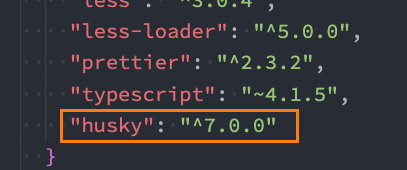
2.在项目目录下创建 .husky 文件夹:
npx huksy install
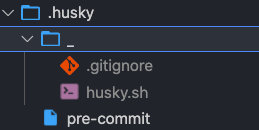
3.在 package.json 中添加一个脚本:
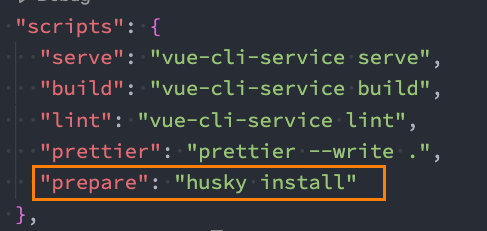
接下来,我们需要去完成一个操作:在进行 commit 时,执行 lint 脚本:

这个时候我们执行 git commit 的时候会自动对代码进行 lint 校验。
1.5. git commit 规范
1.5.1. 代码提交风格
通常我们的 git commit 会按照统一的风格来提交,这样可以快速定位每次提交的内容,方便之后对版本进行控制。
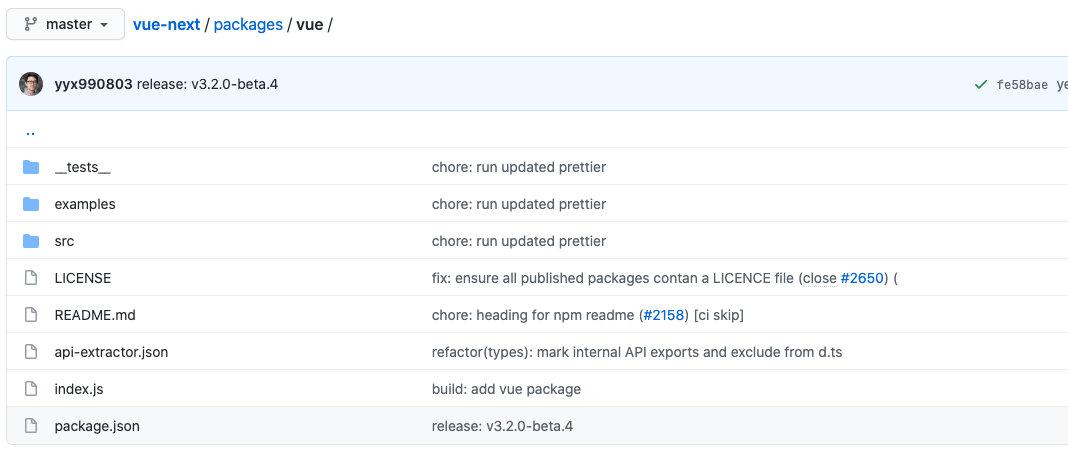
但是如果每次手动来编写这些是比较麻烦的事情,我们可以使用一个工具:Commitizen
-
Commitizen 是一个帮助我们编写规范 commit message 的工具;
1.安装 Commitizen
npm install commitizen -D
2.安装 cz-conventional-changelog,并且初始化 cz-conventional-changelog:
npx commitizen init cz-conventional-changelog --save-dev --save-exact
这个命令会帮助我们安装 cz-conventional-changelog:

并且在 package.json 中进行配置:

这个时候我们提交代码需要使用 npx cz:
- 第一步是选择 type,本次更新的类型
| Type | 作用 |
|---|---|
| feat | 新增特性 (feature) |
| fix | 修复 Bug(bug fix) |
| docs | 修改文档 (documentation) |
| style | 代码格式修改(white-space, formatting, missing semi colons, etc) |
| refactor | 代码重构(refactor) |
| perf | 改善性能(A code change that improves performance) |
| test | 测试(when adding missing tests) |
| build | 变更项目构建或外部依赖(例如 scopes: webpack、gulp、npm 等) |
| ci | 更改持续集成软件的配置文件和 package 中的 scripts 命令,例如 scopes: Travis, Circle 等 |
| chore | 变更构建流程或辅助工具(比如更改测试环境) |
| revert | 代码回退 |
- 第二步选择本次修改的范围(作用域)

- 第三步选择提交的信息

- 第四步提交详细的描述信息

- 第五步是否是一次重大的更改

- 第六步是否影响某个 open issue

我们也可以在 scripts 中构建一个命令来执行 cz:
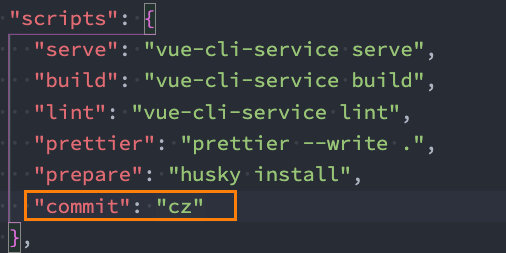
1.5.2. 代码提交验证
如果我们按照 cz 来规范了提交风格,但是依然有同事通过 git commit 按照不规范的格式提交应该怎么办呢?
-
我们可以通过 commitlint 来限制提交;
1.安装 @commitlint/config-conventional 和 @commitlint/cli
npm i @commitlint/config-conventional @commitlint/cli -D
2.在根目录创建 commitlint.config.js 文件,配置 commitlint
module.exports = {
extends: [\'@commitlint/config-conventional\']
}
3.使用 husky 生成 commit-msg 文件,验证提交信息:
npx husky add .husky/commit-msg "npx --no-install commitlint --edit $1"
二. 第三方库集成
2.1. vue.config.js 配置
vue.config.js 有三种配置方式:
- 方式一:直接通过 CLI 提供给我们的选项来配置:
- 比如 publicPath:配置应用程序部署的子目录(默认是
/,相当于部署在https://www.my-app.com/); - 比如 outputDir:修改输出的文件夹;
- 比如 publicPath:配置应用程序部署的子目录(默认是
- 方式二:通过 configureWebpack 修改 webpack 的配置:
- 可以是一个对象,直接会被合并;
- 可以是一个函数,会接收一个 config,可以通过 config 来修改配置;
- 方式三:通过 chainWebpack 修改 webpack 的配置:
- 是一个函数,会接收一个基于 webpack-chain 的 config 对象,可以对配置进行修改;
const path = require(\'path\')
module.exports = {
outputDir: \'./build\',
// configureWebpack: {
// resolve: {
// alias: {
// views: \'@/views\'
// }
// }
// }
// configureWebpack: (config) => {
// config.resolve.alias = {
// \'@\': path.resolve(__dirname, \'src\'),
// views: \'@/views\'
// }
// },
chainWebpack: (config) => {
config.resolve.alias
.set(\'@\', path.resolve(__dirname, \'src\'))
.set(\'views\', \'@/views\')
}
}
2.2. vue-router 集成
安装 vue-router 的最新版本:
npm install vue-router@next
创建 router 对象:
import { createRouter, createWebHashHistory } from \'vue-router\'
import { RouteRecordRaw } from \'vue-router\'
const routes: RouteRecordRaw[] = [
{
path: \'/\',
redirect: \'/main\'
},
{
path: \'/main\',
component: () => import(\'../views/main/main.vue\')
},
{
path: \'/login\',
component: () => import(\'../views/login/login.vue\')
}
]
const router = createRouter({
routes,
history: createWebHashHistory()
})
export default router
安装 router:
import router from \'./router\'
createApp(App).use(router).mount(\'#app\')
在 App.vue 中配置跳转:
<template>
<div id="app">
<router-link to="/login">登录</router-link>
<router-link to="/main">首页</router-link>
<router-view></router-view>
</div>
</template>
2.3. vuex 集成
安装 vuex:
npm install vuex@next
创建 store 对象:
import { createStore } from \'vuex\'
const store = createStore({
state() {
return {
name: \'coderwhy\'
}
}
})
export default store
安装 store:
createApp(App).use(router).use(store).mount(\'#app\')
在 App.vue 中使用:
<h2>{{ $store.state.name }}</h2>
2.4. element-plus 集成
Element Plus,一套为开发者、设计师和产品经理准备的基于 Vue 3.0 的桌面端组件库:
- 相信很多同学在 Vue2 中都使用过 element-ui,而 element-plus 正是 element-ui 针对于 vue3 开发的一个 UI 组件库;
- 它的使用方式和很多其他的组件库是一样的,所以学会 element-plus,其他类似于 ant-design-vue、NaiveUI、VantUI 都是差不多的;
安装 element-plus
npm install element-plus
2.4.1. 全局引入
一种引入 element-plus 的方式是全局引入,代表的含义是所有的组件和插件都会被自动注册:
import ElementPlus from \'element-plus\'
import \'element-plus/lib/theme-chalk/index.css\'
import router from \'./router\'
import store from \'./store\'
createApp(App).use(router).use(store).use(ElementPlus).mount(\'#app\')
2.4.2. 局部引入
也就是在开发中用到某个组件对某个组件进行引入:
<template>
<div id="app">
<router-link to="/login">登录</router-link>
<router-link to="/main">首页</router-link>
<router-view></router-view>
<h2>{{ $store.state.name }}</h2>
<el-button>默认按钮</el-button>
<el-button type="primary">主要按钮</el-button>
<el-button type="success">成功按钮</el-button>
<el-button type="info">信息按钮</el-button>
<el-button type="warning">警告按钮</el-button>
<el-button type="danger">危险按钮</el-button>
</div>
</template>
<script lang="ts">
import { defineComponent } from \'vue\'
import { ElButton } from \'element-plus\'
export default defineComponent({
name: \'App\',
components: {
ElButton
}
})
</script>
<style lang="less"></style>
但是我们会发现是没有对应的样式的,引入样式有两种方式:
-
全局引用样式(像之前做的那样);
-
局部引用样式(通过 babel 的插件);
1.安装 babel 的插件:
npm install babel-plugin-import -D
2.配置 babel.config.js
module.exports = {
plugins: [
[
\'import\',
{
libraryName: \'element-plus\',
customStyleName: (name) => {
return `element-plus/lib/theme-chalk/${name}.css`
}
}
]
],
presets: [\'@vue/cli-plugin-babel/preset\']
}
但是这里依然有个弊端:
- 这些组件我们在多个页面或者组件中使用的时候,都需要导入并且在 components 中进行注册;
- 所以我们可以将它们在全局注册一次;
import {
ElButton,
ElTable,
ElAlert,
ElAside,
ElAutocomplete,
ElAvatar,
ElBacktop,
ElBadge
} from \'element-plus\'
const app = createApp(App)
const components = [
ElButton,
ElTable,
ElAlert,
ElAside,
ElAutocomplete,
ElAvatar,
ElBacktop,
ElBadge
]
for (const cpn of components) {
app.component(cpn.name, cpn)
}
2.5. axios 集成
安装 axios:
npm install axios
封装 axios:
import axios, { AxiosInstance, AxiosRequestConfig, AxiosResponse } from \'axios\'
import { Result } from \'./types\'
import { useUserStore } from \'/@/store/modules/user\'
class HYRequest {
private instance: AxiosInstance
private readonly options: AxiosRequestConfig
constructor(options: AxiosRequestConfig) {
this.options = options
this.instance = axios.create(options)
this.instance.interceptors.request.use(
(config) => {
const token = useUserStore().getToken
if (token) {
config.headers.Authorization = `Bearer ${token}`
}
return config
},
(err) => {
return err
}
)
this.instance.interceptors.response.use(
(res) => {
// 拦截响应的数据
if (res.data.code === 0) {
return res.data.data
}
return res.data
},
(err) => {
return err
}
)
}
request<T = any>(config: AxiosRequestConfig): Promise<T> {
return new Promise((resolve, reject) => {
this.instance
.request<any, AxiosResponse<Result<T>>>(config)
.then((res) => {
resolve(res as unknown as Promise<T>)
})
.catch((err) => {
reject(err)
})
})
}
get<T = any>(config: AxiosRequestConfig): Promise<T> {
return this.request({ ...config, method: \'GET\' })
}
post<T = any>(config: AxiosRequestConfig): Promise<T> {
return this.request({ ...config, method: \'POST\' })
}
patch<T = any>(config: AxiosRequestConfig): Promise<T> {
return this.request({ ...config, method: \'PATCH\' })
}
delete<T = any>(config: AxiosRequestConfig): Promise<T> {
return this.request({ ...config, method: \'DELETE\' })
}
}
export default HYRequest
2.6. VSCode 配置
{
"workbench.iconTheme": "vscode-great-icons",
"editor.fontSize": 17,
"eslint.migration.2_x": "off",
"[javascript]": {
"editor.defaultFormatter": "dbaeumer.vscode-eslint"
},
"files.autoSave": "afterDelay",
"editor.tabSize": 2,
"terminal.integrated.fontSize": 16,
"editor.renderWhitespace": "all",
"editor.quickSuggestions": {
"strings": true
},
"debug.console.fontSize": 15,
"window.zoomLevel": 1,
"emmet.includeLanguages": {
"javascript": "javascriptreact"
},
"explorer.confirmDragAndDrop": false,
"workbench.tree.indent": 16,
"javascript.updateImportsOnFileMove.enabled": "always",
"editor.wordWrap": "on",
"path-intellisense.mappings": {
"@": "${workspaceRoot}/src"
},
"hediet.vscode-drawio.local-storage": "eyIuZHJhd2lvLWNvbmZpZyI6IntcImxhbmd1YWdlXCI6XCJcIixcImN1c3RvbUZvbnRzXCI6W10sXCJsaWJyYXJpZXNcIjpcImdlbmVyYWw7YmFzaWM7YXJyb3dzMjtmbG93Y2hhcnQ7ZXI7c2l0ZW1hcDt1bWw7YnBtbjt3ZWJpY29uc1wiLFwiY3VzdG9tTGlicmFyaWVzXCI6W1wiTC5zY3JhdGNocGFkXCJdLFwicGx1Z2luc1wiOltdLFwicmVjZW50Q29sb3JzXCI6W1wiRkYwMDAwXCIsXCIwMENDNjZcIixcIm5vbmVcIixcIkNDRTVGRlwiLFwiNTI1MjUyXCIsXCJGRjMzMzNcIixcIjMzMzMzM1wiLFwiMzMwMDAwXCIsXCIwMENDQ0NcIixcIkZGNjZCM1wiLFwiRkZGRkZGMDBcIl0sXCJmb3JtYXRXaWR0aFwiOjI0MCxcImNyZWF0ZVRhcmdldFwiOmZhbHNlLFwicGFnZUZvcm1hdFwiOntcInhcIjowLFwieVwiOjAsXCJ3aWR0aFwiOjExNjksXCJoZWlnaHRcIjoxNjU0fSxcInNlYXJjaFwiOnRydWUsXCJzaG93U3RhcnRTY3JlZW5cIjp0cnVlLFwiZ3JpZENvbG9yXCI6XCIjZDBkMGQwXCIsXCJkYXJrR3JpZENvbG9yXCI6XCIjNmU2ZTZlXCIsXCJhdXRvc2F2ZVwiOnRydWUsXCJyZXNpemVJbWFnZXNcIjpudWxsLFwib3BlbkNvdW50ZXJcIjowLFwidmVyc2lvblwiOjE4LFwidW5pdFwiOjEsXCJpc1J1bGVyT25cIjpmYWxzZSxcInVpXCI6XCJcIn0ifQ==",
"hediet.vscode-drawio.theme": "Kennedy",
"editor.fontFamily": "Source Code Pro, \'Courier New\', monospace",
"editor.smoothScrolling": true,
"editor.formatOnSave": true,
"editor.defaultFormatter": "esbenp.prettier-vscode",
"workbench.colorTheme": "Atom One Dark",
"vetur.completion.autoImport": false,
"security.workspace.trust.untrustedFiles": "open",
"eslint.lintTask.enable": true,
"eslint.alwaysShowStatus": true,
"editor.codeActionsOnSave": {
"source.fixAll.eslint": true
}
}
2.7. css 初始化
安装 normalize.css
npm install normalize.css
编写基础 css 格式化代码
body {
padding: 0;
margin: 0;
}
html,
body,
#app {
width: 100%;
height: 100%;
}
统一导入 main.ts
import \'normalize.css\'
import \'@/assets/css/index.less\'
以上是关于vue 项目搭建规范的主要内容,如果未能解决你的问题,请参考以下文章